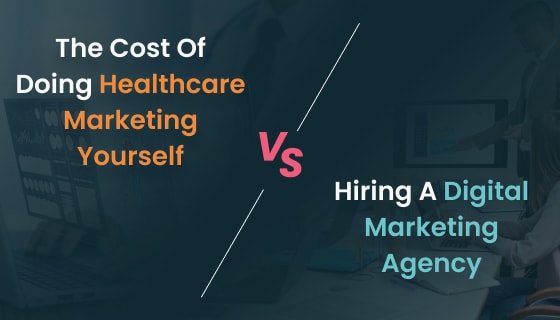Introduction
The future of healthcare marketing isn’t just digital—it’s conversational. With 33% of all searches now voice-driven, patients are no longer typing out long queries; they’re speaking naturally, expecting instant and accurate responses.
Voice search and AI chatbots are revolutionizing patient engagement. Whether it’s finding a doctor, booking an appointment, or getting health-related queries answered, these technologies are transforming how healthcare providers connect with patients. Voice search makes it easier for patients to discover clinics and specialists, often in their preferred language. AI chatbots streamline appointment booking, FAQs, reminders, and follow-ups, reducing operational bottlenecks and enhancing patient experience.
With automation and conversational AI, healthcare providers can improve accessibility, reduce no-shows, and build stronger patient relationships. Embracing these innovations isn’t just an advantage—it’s the future.
A lot of what you will read in this blog was also covered by our CEO, Mr. Kandarp Bhatt, in his talk on HitTalk:5 by Hitcon Healthtech. Watch the full discussion here:

The Rise of Voice Search in Healthcare
How Patients Search for Healthcare Today: Voice vs. Text
The way patients search for healthcare information has undergone a major shift. Traditionally, people would type keywords like “best ENT doctor in Mumbai” or “skin specialist near me.” But with the rise of voice assistants like Google Assistant, Siri, and Alexa, search behavior is changing.
Now, a patient is more likely to ask, “Hey Google, which dermatologist near me is open today?” Voice searches are conversational, longer, and often framed as complete questions. This shift has profound implications for healthcare providers who need to optimize their digital presence for these queries.
Growth of Voice Search in India & Globally
Voice search is no longer a futuristic trend—it’s here, and it’s growing rapidly. In India, 33% of all searches are voice-driven, and the trend is even more pronounced in non-English-speaking regions. Globally, voice search is expected to power nearly 50% of all searches in the coming years.
Why is this happening?
- Smartphone penetration has surged, making voice search more accessible.
- AI-powered voice assistants are improving in accuracy and understanding.
- Hands-free search is more convenient, especially for on-the-go users
- The natural human tendency is to speak rather than type, making voice search more intuitive.
Increase in Regional Language Voice Searches
In India, voice search is not just growing—it’s evolving in local languages. With more than 3X growth in Hindi and Gujarati voice searches, regional language adoption is skyrocketing. Patients are no longer searching in English alone; they are using their native tongues to find healthcare solutions.
For example:
- Typed search: “Best pediatrician Ahmedabad”
- Voice search: “Ahmedabad ma best children doctor kon chhe?” (Who is the best pediatrician in Ahmedabad?)
This shift highlights the need for healthcare businesses to optimize their content not just for English searches but for multilingual and regional voice queries.
Healthcare’s Biggest Opportunity: Optimizing for Voice Search
For healthcare providers, voice search is an untapped goldmine. 43% of voice searches in India are health-related, meaning patients are actively seeking medical services through voice assistants. The question is—how can healthcare businesses take advantage of this?
- Optimize for natural language queries – Focus on long-tail keywords and conversational phrases rather than short, robotic keywords.
- Leverage Google Business Profile (GBP) – Ensure your practice has updated contact details, operating hours, and patient reviews so it appears in voice search results.
- Create voice-friendly content – FAQs and blog content should answer direct patient questions, like “What are the symptoms of diabetes?” rather than just using medical jargon.
- Support regional languages – Adding Hindi, Gujarati, or Tamil search-friendly content can make healthcare businesses more discoverable.
The future of healthcare search is spoken, not typed. Providers who embrace this shift will gain a significant competitive edge in reaching patients faster and more effectively.
Why Voice Search is a Game-Changer for Healthcare Providers
Voice search is reshaping the way patients connect with healthcare services. With 72% of Indian smartphone users relying on voice search daily. It ’s no longer a secondary search method—it’s the primary way many people seek medical help.
The Power of “Near Me” Healthcare Searches
Nearly 43% of all health-related voice searches include “near me”. Patients aren’t just looking for general health advice—they need immediate access to nearby clinics, doctors, and hospitals.
For example:
- Typed search: “Best physiotherapist in Delhi”
- Voice search: “Who is the best physiotherapist near me open now?”
What does this mean for healthcare providers?
As voice search becomes the go-to method for patients seeking healthcare services, providers must adapt to stay competitive. Voice queries are typically more conversational and action-driven, meaning patients aren’t just searching for information—they’re looking to take immediate steps. Optimizing for voice search ensures better visibility, higher engagement, and a seamless patient experience.
- Voice searches are more detailed and action-oriented.
- Patients using voice search are ready to book an appointment.
- Optimized listings for voice search improve local search rankings.
The Shift from Text-Based to Conversational Voice Queries
People no longer type just keywords—they ask full, natural-sounding questions.
- Text Search: “Cardiologist Bangalore”
- Voice Search: “Which cardiologist in Bangalore has the best reviews and accepts walk-ins?”
Since Google prioritizes content that answers voice queries directly, healthcare providers must create content that mirrors real patient conversations.
Why Optimizing Healthcare Services for Voice is Crucial
- Higher Engagement: Voice search delivers more relevant and immediate results, increasing patient interactions.
- Better Local Search Visibility: Clinics and hospitals optimized for voice search rank higher in local results, helping them attract more patients.
- Improved Patient Experience: Voice search makes it easier for people to find and book appointments, leading to better patient satisfaction.
- Competitive Advantage: Early adopters of voice search optimization will stand out in an increasingly digital healthcare landscape.
How Can Healthcare Businesses Optimize for Voice Search?
- Use conversational language – Write website content that answers real patient questions naturally.
- Leverage structured data – Implement schema markup to help Google recognize key services and locations.
- Focus on “near me” searches – Ensure your Google Business Profile is fully optimized with accurate contact details, services, and patient reviews.
- Support multilingual queries – Optimize content for regional languages like Hindi, Gujarati, and Tamil, where voice search adoption is rapidly growing.
Voice search isn’t just a trend—it’s the future of patient engagement. Healthcare providers who adapt now will gain a significant edge in attracting and retaining patients.
AI Chatbots: The 24x7 Digital Receptionist
In today’s fast-paced world, patients expect instant responses, convenient appointment scheduling, and round-the-clock support—something traditional healthcare setups often struggle with. AI chatbots are transforming patient engagement by acting as a 24×7 digital receptionist, streamlining communication and improving accessibility.
How AI Chatbots Enhance Patient Experience
AI-powered chatbots bridge the gap between patients and healthcare providers by offering instant, personalized assistance at any time. They improve the patient experience by:
- Providing instant responses by answering patient inquiries in real time without human intervention.
- Reducing call volume by handling common patient queries, freeing up front desk staff for more critical tasks.
- Offering multilingual support, engaging with patients in their preferred language, making healthcare more inclusive.
With over 80% of routine patient queries being repetitive, chatbots handle these efficiently, ensuring that human support is only required for complex concerns.
Automating FAQs, Appointment Booking, and Reminders
Patients often seek quick answers to common questions like:
- What are your clinic’s working hours?
- Do you accept walk-ins?
- Which insurance do you cover?
AI chatbots automate FAQs and provide accurate, real-time responses without patients having to browse through long website pages or wait on hold.
Beyond FAQs, chatbots streamline essential healthcare functions like:
- Appointment scheduling, allowing patients to book, reschedule, or cancel appointments in seconds via chat.
- Automated reminders, reducing no-shows by sending WhatsApp, SMS, or email reminders for upcoming visits.
- Prescription refills, enabling patients to request medication refills or check prescription status effortlessly.
By automating these tasks, chatbots enhance efficiency, reduce patient frustration, and boost overall satisfaction.
Seamless Integration with Voice Search
The future of patient interactions is conversational AI—a blend of voice search and chatbots.
- A patient searches via voice: “Find a gynecologist near me with same-day appointments.”
- The AI chatbot immediately responds, providing clinic details and appointment slots.
- The patient confirms the booking through a simple voice command or chat.
This integration ensures a frictionless patient journey, from searching for care to booking an appointment—all within seconds.
The Impact of Chatbots on Healthcare Accessibility
AI chatbots are bridging the gap in healthcare access, particularly in:
- Remote & rural areas, where access to immediate medical consultation is limited, chatbots provide telehealth support and guidance.
- 24×7 availability, ensuring patients receive timely assistance, even outside clinic hours.
- Managing patient load by handling routine queries, allowing healthcare professionals to focus on critical cases.
As chatbot technology evolves, it is set to redefine patient engagement, making healthcare more accessible, efficient, and patient-centric.
Voice Search & AI Chatbots in Action
The combination of voice search and AI chatbots is transforming how patients interact with healthcare providers. From discovering clinics via voice assistants to booking appointments through AI-powered chatbots, the patient journey is becoming more seamless, efficient, and accessible. Here’s how these technologies are making a real impact.
A Patient’s Journey: From Voice Search to Chatbot-Assisted Appointment
Imagine a patient waking up with a persistent cough. Instead of typing a long query, they simply ask their voice assistant:
“Hey Google, find a general physician near me who’s open today.”
Within seconds, they receive a list of clinics with operational hours, ratings, and directions. Clicking on the most relevant option, they are redirected to the clinic’s AI-powered chatbot. The chatbot assists them in:
- Checking the doctor’s availability.
- Booking an appointment instantly.
- Sending an automated confirmation and reminder via WhatsApp.
With zero phone calls and minimal effort, the patient secures their appointment in under two minutes. This frictionless experience sets new expectations for healthcare accessibility.
Optimizing Google Business Profile (GBP) for Voice Search: A Game-Changer
Healthcare providers who optimize their Google Business Profile (GBP) for voice search can significantly enhance their visibility and patient engagement. With more people using voice assistants to find medical services, ensuring that clinic details are voice-search-friendly is crucial.
Here’s how this can impact a healthcare practice:
- A clinic optimizing its GBP with voice search-friendly SEO can expect a 40% increase in online appointment bookings.
- As more patients search in regional languages like Hindi and Gujarati, clinics may see a surge in local voice search traffic.
- With a well-optimized profile, clinics can experience higher foot traffic as more people find and trust their services.
By embracing voice search optimization, clinics can position themselves at the top of search results, making it easier for patients to connect and book appointments instantly.
Chatbots in Hospitals & Clinics: Instant Query Resolution & Virtual Assistance
AI-powered chatbots are becoming essential tools in hospitals and clinics, providing 24/7 virtual assistance and reducing administrative burdens. Whether a patient needs information about a procedure or wants to reschedule an appointment, chatbots can handle it all.
Here’s how chatbots are enhancing patient interactions:
- Automated FAQs: Answer common queries about services, costs, and insurance in real-time.
- Appointment Scheduling: Patients can book, reschedule, or cancel appointments without human intervention.
- Medication Reminders: Chatbots send alerts for prescription refills and follow-up visits.
- Multi-Language Support: AI chatbots can communicate in regional languages, breaking language barriers.
With chatbots handling routine tasks, healthcare staff can focus on providing better patient care, improving efficiency and satisfaction.
How Voice & AI-Powered Chatbots Create a Frictionless Patient Experience
The integration of voice search and AI chatbots eliminates traditional barriers to accessing healthcare. Instead of waiting on hold or struggling to navigate a website, patients get instant assistance.
Key benefits include:
- Faster Access to Care: Patients find clinics and book appointments within seconds.
- Enhanced Patient Engagement: Real-time responses and automated reminders reduce missed appointments.
- 24/7 Availability: Chatbots ensure patients receive support anytime, even outside clinic hours.
- Personalized Experience: AI-driven insights enable tailored responses based on past interactions.
By leveraging voice search and AI chatbots, healthcare providers are not only improving patient experience but also gaining a competitive edge in a rapidly evolving digital landscape.
The Modern Patient Funnel: From Query to Consultation
The way patients discover and engage with healthcare providers is evolving rapidly. Gone are the days of manually searching directories or calling clinics to check availability. Today, the modern patient journey is driven by voice search and AI chatbots, creating a seamless funnel from the initial query to a confirmed appointment. Here’s how it works:
Step 1: Patient Uses Voice Search to Find a Doctor
A patient experiencing persistent back pain simply asks their voice assistant:
“Hey Siri, find the best orthopedic doctor near me.”
Instead of typing and filtering through results, the patient receives instant, relevant options tailored to their location and needs.
Step 2: Optimized Google Business Profile Appears with Clinic Details
Among the top results is a well-optimized Google Business Profile (GBP) of a nearby orthopedic clinic, displaying:
- Operating hours
- Patient reviews and ratings
- Contact details
- Directions via Google Maps
Since voice search prioritizes localized, structured information, clinics with a fully optimized GBP appear at the top—maximizing visibility.
Step 3: Patients Click to Chat via WhatsApp or Website Chatbots
Rather than making a phone call, the patient clicks the WhatsApp Chat or website chatbot option. They are instantly connected to the clinic’s AI-powered assistant, which greets them and asks how it can help.
Step 4: AI Chatbot Assists with Booking & Follow-Ups
The chatbot provides:
- Doctor availability and consultation slots
- Instant appointment scheduling based on the patient’s preference
- FAQs on consultation fees, insurance, and treatment procedures
By handling these tasks instantly and without human intervention, the chatbot reduces front-desk workload and enhances patient convenience.
Step 5: Appointment Confirmation & Reminders
Once the booking is complete, the chatbot sends:
- Instant confirmation via WhatsApp and SMS
- Automated reminders 24 hours and one hour before the appointment
- Follow-up messages post-consultation, encouraging patient feedback
With this fully automated voice-to-chatbot patient funnel, clinics not only increase bookings and reduce no-shows but also deliver a modern, frictionless patient experience that meets today’s digital expectations.
The Business Impact of Voice Search & AI Chatbots
Healthcare providers that embrace voice search and AI chatbots are experiencing significant business benefits. These technologies are not just enhancing patient experience—they are also driving measurable improvements in efficiency, revenue, and reputation. Here’s how:
Increase in Appointment Bookings Through Conversational AI
With voice search-optimized listings and AI-powered chatbots, clinics and hospitals are seeing a rise in appointment bookings. Patients can now:
- Find healthcare providers faster through voice search.
- Instantly book appointments without calling a front desk.
- Receive chatbot assistance 24/7, reducing missed opportunities outside business hours.
Reduction in Front Desk Workload & Operational Costs
With voice search-optimized listings and AI-powered chatbots, clinics and hospitals are seeing a rise in appointment bookings. Patients can now:
- Find healthcare providers faster through voice search.
- Instantly book appointments without calling a front desk.
- Receive chatbot assistance 24/7, reducing missed opportunities outside business hours.
Reduction in Front Desk Workload & Operational Costs
AI chatbots automate repetitive tasks, freeing up clinic staff to focus on in-person patient care. They handle:
- Appointment scheduling and rescheduling.
- Common FAQs on treatments, fees, and insurance.
- Prescription refill requests and follow-ups.
This reduces human intervention, leading to lower operational costs and higher efficiency.
Lower No-Show Rates Due to AI-Powered Reminders
Missed appointments cost healthcare providers time and revenue. AI chatbots reduce no-show rates by:
- Sending automated reminders via WhatsApp, SMS, or email.
- Allowing patients to confirm, cancel, or reschedule with a single click.
- Offering last-minute slot reassignments to optimize schedules.
With these proactive reminders, clinics are seeing a significant drop in appointment no-shows.
Improved Patient Satisfaction & Google Ratings
Convenience is key in modern healthcare. When patients can:
- Find doctors effortlessly through voice search.
- Book appointments instantly via chatbots.
- Receive timely reminders and post-visit follow-ups.
Their overall experience improves, leading to:
- Higher patient satisfaction.
- More positive reviews on Google and other platforms.
- Increased word-of-mouth referrals and brand trust.
By integrating voice search and AI chatbots, healthcare providers are not just staying ahead in digital transformation—they are also enhancing patient care while improving their bottom line.
How Healthcare Businesses Can Optimize for Voice & AI
As voice search and AI-driven chatbots reshape healthcare marketing, providers must adapt to remain competitive. Optimizing for these technologies enhances discoverability, engagement, and efficiency, ensuring a seamless patient experience. Here’s how healthcare businesses can leverage voice search and AI effectively.
Voice SEO Strategies: Conversational Keywords, Local SEO & Schema Markup
To rank higher in voice search results, healthcare providers need to optimize their digital presence with:
- Conversational Keywords – Patients use natural language queries, such as “Which dermatologist near me is open now?” instead of short text-based searches. Content should reflect full-sentence queries and FAQs.
- Local SEO Optimization – Since 43% of voice searches are location-based, clinics and hospitals must optimize their Google Business Profile (GBP) with accurate information, service details, and patient reviews.
- Schema Markup for Voice Search – Implementing structured data (like MedicalEntity Schema) helps search engines understand and display healthcare-related content more effectively in voice search results.
Integrating AI Chatbots: Website, WhatsApp & Google Business Profile
AI chatbots act as 24/7 virtual assistants, streamlining patient interactions. Healthcare businesses should integrate them across key touchpoints:
- Website Chatbots – Placed on clinic/hospital websites, these assist visitors with appointment booking, FAQs, and consultation inquiries
- WhatsApp Chatbots – WhatsApp’s popularity makes it an essential platform for AI-driven patient communication, enabling instant replies and appointment confirmations
- Google Business Profile (GBP) Chatbots – Enabling direct chat features on GBP ensures patients can interact with a clinic before even visiting the website
Enhancing Patient Engagement Through Automated Responses & Follow-Ups
AI-powered automation ensures consistent and proactive patient communication, leading to better engagement. Key strategies include:
- Instant Query Resolution – AI chatbots provide immediate responses to common health-related inquiries, reducing response time.
- Automated Appointment Follow-Ups – Reminders for scheduled visits, prescription refills, and health checkups keep patients engaged and reduce no-show rates.
- Post-Consultation Surveys & Feedback Requests – AI-driven follow-ups encourage patients to leave reviews, enhancing a clinic’s reputation.
Leveraging AI Tools for Personalized Healthcare Marketing
AI goes beyond automation—it enables personalized patient engagement through data-driven insights. Healthcare businesses can:
- Use AI-Powered Analytics – Predict patient needs and send tailored health reminders (e.g., vaccination schedules, diet recommendations).
- Implement AI-Powered Chatbots for Consultations – Some providers integrate AI-driven symptom checkers to assist in preliminary patient assessments.
- Enhance Retargeting Campaigns – AI can analyze patient interactions and recommend targeted ads or content, improving conversion rates.
By implementing these strategies, healthcare providers can create a frictionless digital experience, ensuring patients find, engage with, and trust their services.
Addressing Common Concerns About AI & Voice Search
Despite the clear benefits of voice search and AI chatbots in healthcare, many providers hesitate to adopt these technologies due to common misconceptions. The reality is that AI and voice search enhance accessibility, improve efficiency, and provide cost-effective solutions that benefit both patients and healthcare businesses. Let’s break down some of the biggest concerns:
Common Myths vs. Reality
| Concern | Reality |
| “My patients don’t use technology.” | Voice search is simpler than typing, with 72% of Indian smartphone users relying on voice commands daily. Even seniors find it easier than typing. |
| “AI chatbots aren’t reliable.” | AI chatbots don’t replace human interaction; they handle routine queries, book appointments, and send reminders, allowing staff to focus on patient care. |
| “It’s too expensive.” | AI solutions are affordable, with pricing starting as low as ₹999/month. The ROI from reduced no-shows and increased bookings makes it a smart investment. |
| “Patients prefer human interaction.” | AI chatbots provide instant responses and seamlessly transition to human support when needed, offering a hybrid approach. |
| “AI can’t handle regional languages.” | Modern AI solutions support Gujarati, Hindi, and other regional languages, making healthcare more accessible. |
| “Voice search is just a trend.” | Voice search is here to stay, with 43% of health-related searches being “near me” queries. Clinics optimized for voice search attract more patients. |
Ensuring AI Chatbots Complement Human Care
The rise of AI chatbots in healthcare is not about replacing human expertise, but rather about enhancing efficiency and improving patient experiences. AI-powered assistants are designed to handle routine administrative tasks, such as answering FAQs, scheduling appointments, and sending reminders, allowing healthcare staff to devote more time to patient care.
For example, instead of spending 10-15 minutes per patient on scheduling and rescheduling, front desk teams can focus on personalized patient interactions and urgent cases. AI chatbots can also provide multilingual support, helping patients communicate in their preferred language, which is particularly beneficial in a country as diverse as India.
The key to success is blending AI automation with human expertise—ensuring that while chatbots handle repetitive queries, human professionals remain available for more complex concerns. This hybrid approach ensures efficiency without compromising empathy, giving patients the best of both worlds.
The Cost-Effectiveness of AI in Healthcare
While some clinics hesitate to adopt AI due to budget concerns, the reality is that AI-driven solutions save more money than they cost. The implementation of AI chatbots and voice search optimization results in long-term operational benefits, directly impacting revenue growth and patient retention.
Here’s how AI-powered solutions drive cost-effectiveness in healthcare:
- Lower Front Desk Workload: AI chatbots reduce administrative burdens by automating patient inquiries, reducing the need for additional staffing and cutting operational costs.
- Fewer No-Shows: AI-driven appointment reminders and rescheduling options help patients stay on track, decreasing missed appointments and ensuring a steady revenue flow.
- More Online Bookings: By integrating WhatsApp chatbots and optimized Google Business Profiles, clinics can increase online appointment bookings by up to 40%.
- 24×7 Availability: Unlike human staff, AI chatbots operate round the clock, ensuring that patient queries are never left unanswered, even outside clinic hours.
Furthermore, early adopters of AI in healthcare gain a competitive advantage, as they can scale operations efficiently without adding significant overhead costs. With advancements in conversational AI and voice search, healthcare providers have the opportunity to deliver seamless patient experiences while maximizing profitability.
The Future of Healthcare Marketing with Voice & AI
As digital adoption accelerates, voice search and AI chatbots are becoming essential tools in healthcare marketing and patient engagement. The future lies in hyper-personalized, AI-driven interactions, enabling healthcare providers to deliver better care, improve accessibility, and optimize operations. From regional language voice bots to AI-powered virtual health assistants, the landscape of healthcare is evolving rapidly.
Voice Bots in Regional Languages - Hindi, Gujarati, Tamil, etc.
While English remains dominant in digital interactions, voice search in regional languages is surging. Millions of Indian users search for health-related queries in Hindi, Gujarati, Tamil, and other native languages. AI-powered voice bots trained in multilingual conversations will bridge the language gap, allowing non-English-speaking patients to access medical assistance seamlessly.
For instance, a voice bot in Gujarati could help elderly patients book appointments, understand prescriptions, or get general health advice without typing—a major step toward inclusive healthcare.
AI-Powered Virtual Health Assistants for Patient Interactions
Beyond chatbots, AI-driven virtual health assistants are transforming patient engagement. These assistants can:
- Provide instant responses to health queries.
- Guide patients through symptom checkers before recommending a consultation.
- Offer personalized wellness tips based on a patient’s medical history.
- Automate post-consultation care, ensuring adherence to prescribed treatments.
As AI continues to evolve, virtual assistants will become smarter, offering real-time support and helping patients manage chronic conditions more efficiently.
Smart Clinics Over Large Hospitals: The AI-Driven Healthcare Model
With the integration of AI and automation, the healthcare ecosystem is shifting from large hospital chains to tech-enabled smart clinics that provide faster, more efficient services. AI-powered solutions will:
- Reduce wait times by automating check-ins and pre-diagnosis procedures.
- Improve doctor-patient interactions by summarizing patient histories before appointments.
- Enhance telemedicine services, making consultations more efficient.
By leveraging AI and voice search, small clinics can compete with large hospitals, offering high-quality, patient-centric care at lower operational costs.
Beyond Chatbots: AI-Driven Healthcare Personalization & Automation
The future of AI in healthcare goes beyond appointment scheduling and FAQs—it’s about personalized care delivery. With advanced AI models, healthcare providers can:
- Analyze patient data to deliver customized treatment plans.
- Send predictive health alerts based on medical history and lifestyle.
- Automate follow-ups and medication reminders through AI-powered systems.
- Enhance digital marketing efforts with AI-driven audience targeting.
As AI and voice search continue to evolve, healthcare marketing will become more intuitive, accessible, and patient-friendly. The clinics and hospitals that adapt early will lead the way in delivering smarter, faster, and more personalized healthcare experiences.
Conclusion
The integration of Voice Search & AI Chatbots is revolutionizing healthcare marketing and patient engagement. As more patients rely on voice assistants for health-related searches and AI chatbots for instant interactions, the need for automation and conversational AI has never been more crucial. These technologies are not just trends; they are game-changers that enhance accessibility, efficiency, and patient satisfaction. Healthcare providers that fail to adapt to AI-driven solutions risk falling behind. Voice search optimization ensures higher visibility, while AI chatbots streamline appointments, patient queries, and reminders, significantly reducing front desk workload. Early adoption of these technologies means better patient experiences, increased bookings, and lower operational costs—all essential for thriving in the digital era. Those who embrace AI and voice search today will be the leaders of tomorrow’s healthcare industry. The shift toward conversational AI and automation is already underway, and the healthcare businesses that invest in voice-optimized strategies and AI-powered patient interactions will gain a long-term competitive edge. ZealousWeb specializes in cutting-edge AI and voice solutions tailored for the healthcare industry. Our expertise in AI chatbots, voice search optimization, and automation helps healthcare providers enhance patient engagement, optimize operations, and stay ahead in an evolving digital landscape. Let’s build the future of smart, AI-driven healthcare together.











